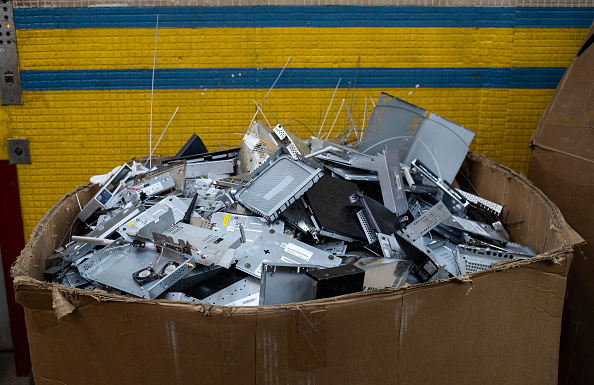iFixit CEO names and shames tech giants for right to repair obstruction | ZDNet

Image: Getty Images
iFixit co-founder and CEO Kyle Wiens has exposed how companies including Apple, Samsung, and Microsoft manipulate the design of their products and the supply chain to prevent consumers and third-party repairers from accessing necessary tools and parts to repair products such as smartphones and laptops.
Speaking during the Productivity Commission’s virtual right to repair public hearing on Monday, Weins took the opportunity to draw on specific examples of how some of the largest tech companies are obstructing consumers from a right to repair.
“We’ve seen manufacturers restrict our ability to buy parts. There’s a German battery manufacturer named Varta that sells batteries to a wide variety of companies. Samsung happens to use these batteries in their Galaxy earbuds … but when we go to Varta and say can we buy that part as a repair part, they’ll say ‘No, our contract with Samsung will not allow us to sell that’. We’re seeing that increasingly,” he said.
“Apple is notorious for doing this with the chips in their computers. There’s a particular charging chip on the MacBook Pro … there is a standard version of the part and then there’s the Apple version of the part that sits very slightly tweaked, but it’s tweaked enough that it’s only required to work in this computer, and that company again is under contractual requirement with Apple.”
He continued, highlighting that a California-based recycler was contracted by Apple to recycle spare parts that were still in new condition.
“California Apple stops providing service after seven years, so this was at seven years and Apple have warehouses full of spare parts, and rather than selling that out in the marketplace — so someone like me who eagerly would’ve bought them — they were paying the recycler to destroy them,” Wiens said.
Weins also pointed to an example involving a Microsoft Surface laptop.
“[iFixit] rated it on our repairability score, we normally rate products from one to 10; the Surface laptop got a zero. It had a glued-in battery … we had to actually cut our way into the product and destroyed it in the process of trying to get inside,” he said.
When asked whether 3D printing spare parts could be a potential way around repairing products, Wiens acknowledged that while it could be a solution, it would not be a practical one for tech-based products.
“3D printing is a wonderful idea … we do have some 3D printed models on iFixit … unfortunately, in our analysis of parts, about 2% of all parts can be 3D printed with current technology … where 3D printing is more compelling and interesting is in whitegoods,” he said.
The other major point that was covered during the Productivity Commission’s public hearing was whether there is plausibility to introduce a labelling scheme, much like one that exists in France, in Australia.
Introduced at the start of the year, the French repair index was designed to encourage manufacturers to display clear information about the repairability of their product. It currently applies to five product categories: Smartphones, laptops, televisions, washing machines, and lawn mowers.
Based on his observation, Weins said the adoption of the French index has been “pretty universal” across all five categories. He also pointed out that a recent Samsung survey showed 86% of French citizens say that the index impacts their purchasing behaviour while 80% said they would give up their favourite brand for a more repairable product.
“This is really substantially driving consumer behaviour,” he said.
For consumer group Choice, the possibility of introducing a labelling scheme to improve right to repair in Australia could work.
“We know from experience, particularly with the water and energy labelling scheme, that if you want manufacturers to improve the quality of products, start by rating and ranking them,” Choice campaign and communications director Erin Turner said during the hearing.
“Consumers would really benefit from a scheme that ranked and rated products in durability and repair. It’d be even better if that ranking was translated to a publicly available piece of information: A label that lets them see the information when comparing products.
“Over time we would expect manufacturers to compete, where they saw that durability and repairability were factors that were influencing consumer product decisions.”
She suggested, if such a labelling scheme were to exist, one of the first product areas it could be applied to would be for right to repair of technical electronic products.
“Laptops and smartphones is where people have a lot of anxiety and there’s a lot of international information and standardisation of products. An Apple is an Apple from Australia, New Zealand, America so you can build a bit more in. You can build a scheme for Australia but [base its] rules on international data,” Turner said.
Besides supporting the idea of a labelling scheme, Turner also believes there is an opportunity to amend the current Consumer Law so that product warranties and guarantees are more clear.
“I do think that there’s room to amend the law to make businesses more responsible for … the sin of omission happens so often, it’s sometimes not even a sin of omission, sometimes we hear from consumers that it’s just an outright lie … we see where businesses consistently just deny that people have rights under the Consumer Law, they do it consistently, they do it in writing … and sometimes the products that are failing again and again … particularly tech, we see it a lot with laptops,” she said.
More on right to repair movement
For all the latest Technology News Click Here
For the latest news and updates, follow us on Google News.
